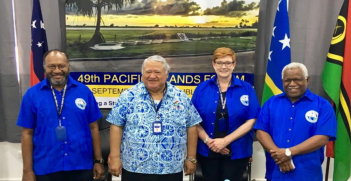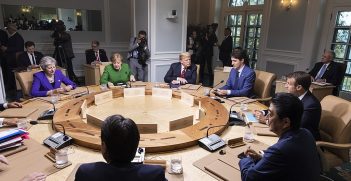B20: An Opportunity in 2014
Collaboration on infrastructure investment, removing trade barriers, allocation of human capital and major financial reform are worthy goals for this year’s G20, writes B20 Sherpa Robert Milliner.
The challenge put to G20 leaders following 2013’s Saint Petersburg Summit was to take decisive action to return the global economy to strong, sustainable growth. Accordingly, during his address to the World Economic Forum in Switzerland, on 23 January, Prime Minister Tony Abbott articulated a solid vision for Australia’s host year, committing to focus on stronger growth and making the global economy more resilient to deal with future shocks.
The Finance Ministers and Central Bank Governors meeting in February then built on this clear agenda with G20 governments pledging to work together to identify new measures to lift collective GDP by more than two per cent above trend over the next five years. In addition to existing macroeconomic policies, they committed to take concrete action to increase investment, lift employment and participation, enhance trade and promote competition. The B20 strongly supports all these objectives.
At the World Economic Forum, Mr Abbott also highlighted the absolute centrality of private business to sustainable growth; he said if the economic policies of our countries do not successfully promote and foster profitable private businesses, they simply do not work at all. These comments don’t just imply a business-friendly agenda but recognise that business will play a vital role in the global economic recovery.
Business input into the G20 agenda
Since the B20 was first convened as part of the Canadian presidency in 2010, it’s played an important role in the G20 process in the five Summits since, the B20 has produced more than 440 recommendations to G20 Leaders.
This year, B20 has undertaken research to identify the most substantial obstacles to global growth and job creation. Four priority areas were identified – financing growth, human capital, infrastructure and investment, and trade – and specific taskforces established to develop a set of pragmatic recommendations for G20.
Drawn from some 300 members of the international business community, the four taskforces have been meeting regularly to brainstorm, test and refine potential solutions ahead of July’s B20 Sydney Summit. And together with B20’s Australia Leadership Group, a select group of international CEOs (dubbed the CEO Forum) continue to inform and guide each of the taskforces’ work. An outline of their challenges are as follows:
- Financing growth
The availability of credit to business is vital to global economic growth. New capital requirements for lenders, arising from Basel III, may reduce the availability of financing for Small and Medium Enterprises (SMEs), major infrastructure projects and exporters/ importers – all key engines of job creation. Also, given financial markets are at different stages of development in various regions, the Institute of International Finance advises that uniform regulation can have unintended consequences and may not be compatible with growth in other parts of the world.
- Human capital
Long-term and youth unemploymentare key human capital challenges, but a paradox exists in many countries: while unemployment remains relatively high, some economies struggle to fill job vacancies. This implies that there is a major mismatch in skills between what business is demanding and what is available. Workplaces are being transformed by technology, with one report suggesting 47 per cent of job categories could be automated within 20 years. This coincides with a fundamental shift in sought skills, as science, technology and maths skills become more important.
3. Infrastructure and investment
G20 countries face a number of common challenges including population growth, especially in the cities. To address these, one think-tank of global economists, the McKinsey Global Institute, advises at least $57 trillion is needed to fund infrastructure investment to 2030. However, according to an estimate by Boston Consulting Group based on current trends, government spending reductions needed to meet the IMF debt-to-GDP targets mean approximately $15 trillion will go unfunded. Other challenges also persist, including risk/ reward objectives for large pools of private sector capital that are misaligned with the projects of greatest need, varying and/ or obscure procurement processes, and regulatory or environmental approval delays.
- Trade
According to the World Trade Organisation’s 2013 Report, growth in world trade has flattened since 2011; in comparison, post- WWII, growth was generally around twice the rate of global economic growth. While additional tariff protections have been avoided since 2008, G20 nations have increasingly imposed a significant number of non-tariff barriers. Services are becoming integral to world trade even though they still only account for 20 per cent, despite representing 70 per cent of global GDP.
Additionally, through engagement with the G20’s Anti-Corruption Working Group, the B20 will highlight specific instances in which corruption and a lack of transparency create impediments to economic and employment growth across the four aforementioned priority areas.
Realising success
When the B20 Sydney Summit comes together on 16-18 July, followed by the G20 Trade Ministers meeting on 19 July, it will be an opportunity to discuss, finalise and prioritise policy recommendations ahead of the G20 Leaders Summit in Brisbane in November. Bridging the gap in infrastructure investment, removing barriers to trade, improving the allocation of global human capital and completing major financial reforms would all be real achievements from Australia’s G20 year. For the B20, the best way to drive strong, sustainable economic growth and create jobs is to work collaboratively on the key areas that will deliver a better environment for investment.
Robert Milliner is a is a Senior Adviser at UBS and the B20 Sherpa for Australia for 2014.
This is an extract from G20: Words into Action Brisbane 2014, to be published by Faircount Media in association with the Australian Institute of International Affairs in October 2014.





